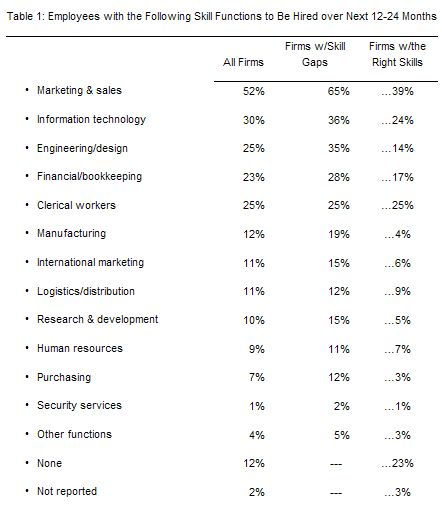"Over the past two years, CEOs were focused on cost containment, making deep workforce cuts in anticipation of a protracted recession," says Ken Esch, a partner in PwC's Private Company Services practice. "Emerging from the recession, companies are now shifting their focus, with growth being top of mind these days and executives repositioning their companies for the long term. For many firms, this means making strategic hires in areas that will drive growth, as well as looking carefully at current people and pivotal roles that create value."
Private-company leaders who say their businesses have skill gaps expect to grow at a rate of 11.4% over the next 12 months (compared with a rate of 8.5% among companies claiming to have no skill gaps). They're also planning major new investments (40%, compared with 29% of companies without skill gaps) and plan to hire new employees over the next year (69% with gaps vs. 45% without).

Hire or Train Existing Talent to Fill Skill Gaps
While 79% of all companies surveyed plan to hire new talent, more than three-quarters (80%) intend to develop existing talent. Hiring talent is more of a focus for companies with skill gaps (91%), with 52% of those companies considering it a major initiative. Slightly fewer (89%) of companies with skill gaps plan to develop existing talent; only 42% of them say it's a major initiative.
As for Trendsetter companies with an international presence, more of them have plans for employee hiring than their domestic-only peers, which is in line with more international marketers having skill gaps than do domestic companies. Eighty-three percent of international marketers plan to hire new talent, compared with 75% of their domestic-only peers.
"As CEOs strive for the ideal workforce composition, they should assess available talent inside the company when looking to fill skill gaps, in addition to actively seeking attractive candidates from outside the company," says Esch. "Striking the right balance between hiring talent externally and developing talent internally is crucial for all companies, regardless of size."
Challenging Workforce Issues
As private companies reposition themselves for growth, they are facing several distinct workforce challenges. Over two-thirds (69%) of Trendsetter private-company executives overall rank maintaining competitive compensation and benefits within acceptable costs as the top challenge among those they were asked about. Of those Trendsetter companies confronting skill gaps, they rank sourcing and securing needed talent as their most challenging workforce issue (82%), followed by maintaining competitive compensation and benefits within acceptable costs (73%) and hiring/retaining skilled professionals (73%).
Attracting and retaining talent is clearly a concern for the vast majority of Trendsetter executives. To address that concern, three-fourths of all private companies surveyed are investing (or planning to invest) in two key areas over the next two years: in-depth training programs (77%) and healthcare/benefits programs (75%). Firms with skill gaps are also investing (or planning to invest) in special incentive programs (74%), formal mentoring/coaching programs (73%) and formal career-path development (70%).
"The Trendsetter data supports what we've seen increasingly among our clients - the importance of motivating, engaging, and retaining current employees," says Esch. "Certainly benefits are a part of this equation and one that private companies need to consider carefully. Managing the costs of employee benefits while remaining competitive and motivating workers is increasingly difficult in today's environment. So, too, is paying competitive salaries - although the US economy is growing, it is doing so at a slow rate, and so most private companies need to remain prudent in their pay policies for now. Offering non-financial incentives such as formal mentoring and coaching programs, career-path development, and flexible work arrangements may be more effective over time than financial incentives."
Moving beyond tomorrow's uncertainty and growing your business matters to you, and to us. Experience what it is like to work with professionals dedicated to serving private companies and their owners. Working with you on both day-to-day and more-complex issues such as compliance, controls, cash flow, expansion, succession, and personal financial matters - this is PwC's Private Company Services.





